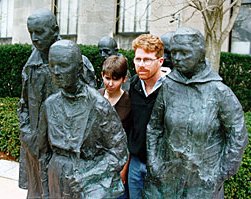
|
S
T E V E N
G
O U L D & L A U R A J. M I X O N : Two by Two (excerpted from Locus Magazine, August 1997) | |||
 Photo by Beth Gwinn other interview excerpts |
Steven C. Gould's first story "The Touch of Their Eyes" apear in Analog in 1980. It was followed by about one story a year for ten years, including "Peaches for Mad Molly", a Hugo and Nebula nominee, and "Rory", a Hugo nominee. His first novel, Jumper, appeared in 1992, and his second, Wildside, in 1996. Laura J. Mixon published her first book, Astro Pilots, as part of a Young Adult series from Scholastic/Omni books in 1987. Her second, Glass Houses, was serialized in Analog in 1991 and published by Tor a year later. Together, they have written Greenwar, just published as a Tor/Forge hardcover. SG: "Greenwar has two points of view: technology is the answer, and technology is part of the problem. Our answer is, appropriate technology applied wisely is the answer. That's simplistic, but in the environmental movement, there are very definite viewpoints that are down on almost any technology applied." LM: "Greenwar is a thriller, very near-future. The technology is existing technology, it just hasn't been implemented yet. For me, science fiction is about commenting on society, on change. I really like science fiction that deals with cultural and political and technological issues, all mixed up, with good characterization and excellent style! I want it all!" SG: "Science fiction is more of an emotional thing for me, and it's also been the reason I've been writing borderline YA -- science fiction rescued me as an adolescent, really pulled me out of a not very pleasant home situation. Salvatation was Heinlein juveniles, Andre Norton. One of the major things science fiction was saying is that what most of the people believe around you is not the only world." LM: "Proxies, my new novel, is set in the same universe as Glass Houses, but Proxies is a much bigger book, set in Albuquerque and Austin and orbital and everywhere. I believe the information revolution we're experiencing right now, which is wonderful, has some significant trade-offs. We lose touch with reality, the more we're exposed to the influx of imagery, and information, and the life of the intellect..."
SG: "In my next book, The Glass Helm, I've jumped 450 years in the future -- but also backwards, because we've got a colony with limited technology. It starts out with the destruction of most of the earth's ecosystem, and 4,500 poeple huddled on the moon in facilities designed for 900, trying to make the human race survive at that point. That's just the prolog."
|
||
| © 1997 by Locus Publications. All rights reserved. |